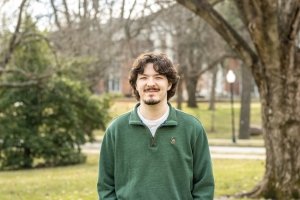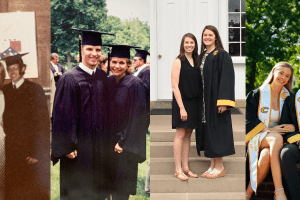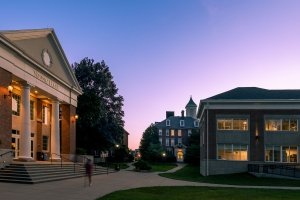Rick Axtell has marked the milestones of the Centre College community
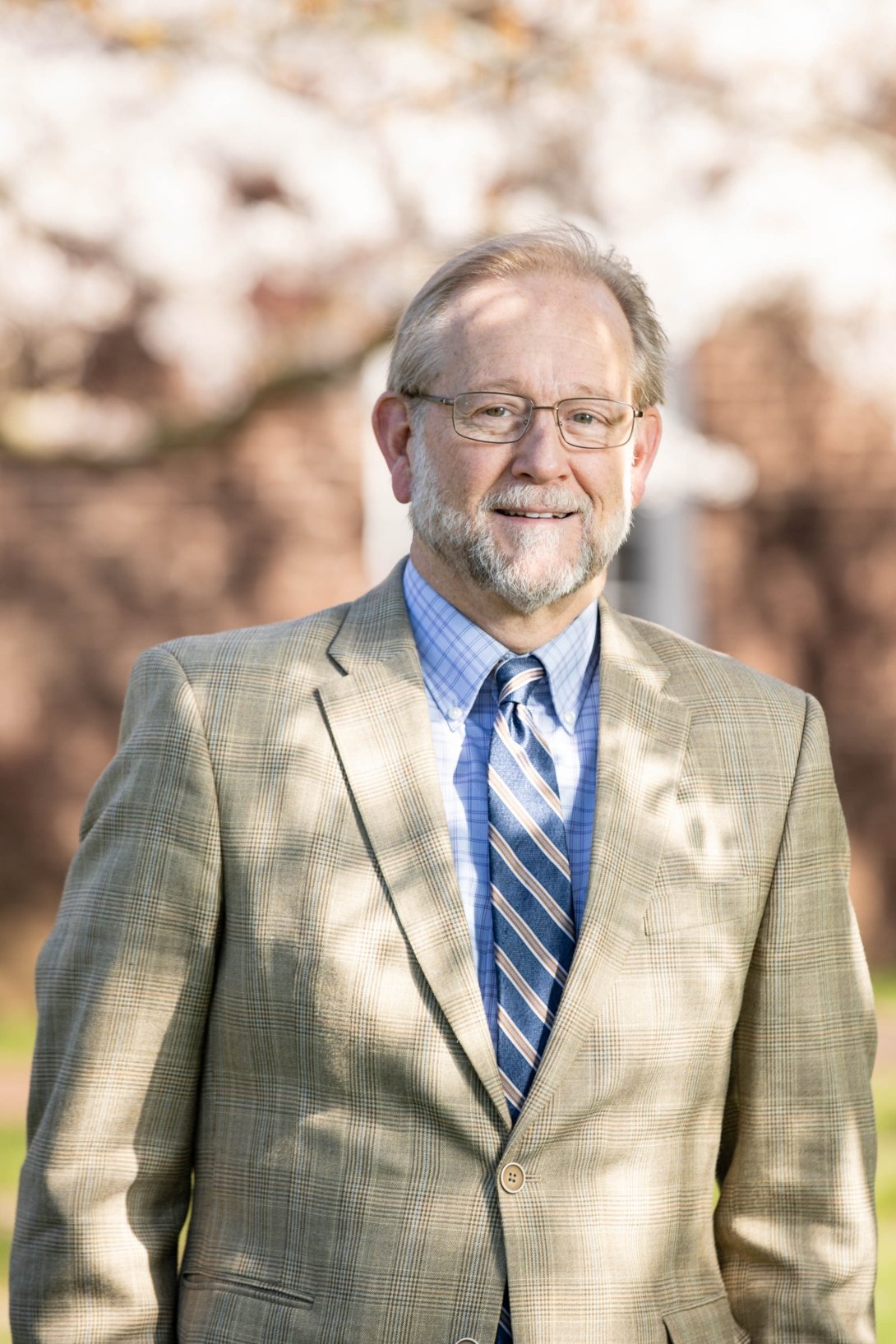
Rick Axtell’s service to the Centre community has extended beyond his religion classes and even his work as a chaplain. He has officiated scores of weddings, led memorial services and helped mark the most significant life moments for a generation of students, colleagues and friends.
These articles first appear in the Spring 2024 edition of Centrepiece.
It’s not the clocks or calendars we surround ourselves with that truly measure our lives: it’s the milestones that stand as waypoints in our memory.
That has been true throughout human existence from cave paintings to oral family histories to Instagram reels.
Where were you on Dec. 3, 1989, at 7:55 p.m.?
Who can remember? But that amazing dessert you shared with your closest friend just as the first snow of the year started to fall — that moment plays in your memory like a home movie.
Culturally, we mark many of the events that stand out from all others. We celebrate achievements, weddings and transitions. We mourn losses and departures.
In movies and books, we like to imagine someone will be with us in these moments, marking the significance. Literature is replete with these beings: fates, choruses, watchers, sentinels and guardian angels – or those very human mediators of comfort or grace, perhaps even shapers of meaning in the ritual pauses of our lives.
For the last three decades, the Centre college community has had one of its own filling that role — Rick Axtell, who is retiring in May.
— — —
A native of the Chicago area, Axtell initially taught at Centre in 1992-93 and returned to the college in 1995 where he has remained since. As H. W. Stodghill, Jr. and Adele H. Stodghill Professor of Religion and College Chaplain, he was named a Centre Scholar in 2003 and 2008, and received the Kirk Award for excellence in teaching in 2000 and 2015. In 2012, he was included in The Princeton Review’s The Best 300 Professors, and he received the Presidential Award for Excellence in 2022.
Prior to Centre, Axtell earned his Ph.D from Southern Baptist Theological Seminary and completed advanced study at the University of Notre Dame.
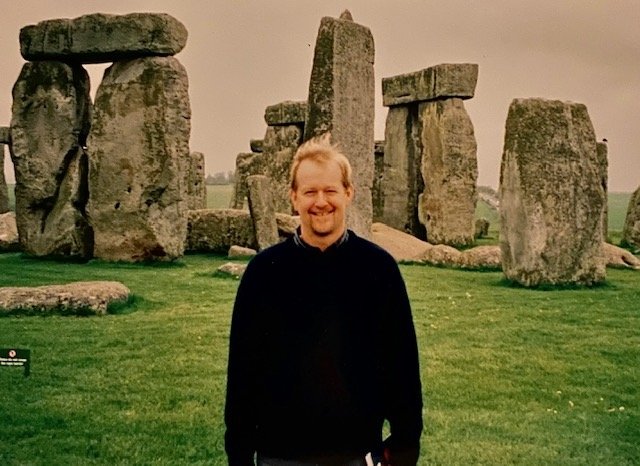
Axtell’s career has been marked by his work to understand and to combat poverty and homelessness, as well as to advocate for a society that prioritizes human needs and human rights. His life’s work was inspired, in part, by a summer working in Bangladesh in 1976, just five years after its bitter fight for independence from Pakistan and on the heels of one of the worst famines of the 20th century.
What he saw there left an enduring mark on his approach to education, ministry, religion and how we treat each other. His subsequent work as resident assistant and case manager in two Louisville homeless shelters, and numerous “delegations” to sites of conflict in Central America, further shaped his passion for the study of social ethics in the context of religion. How people harness religion as the means to various ends, for better or for worse, became a focus for him
“Religion can function as a terribly harmful phenomenon that cuts off the possibility of mutual understanding and human flourishing, and religion is sometimes the deep foundation of movements for positive social change and liberation,” he said. “I found that as stimulating, and as fascinating as any study I could get into.
“And so it became kind of a passion to study religious ethics, and how religion can be the source of conflict — and horrible conflict as we see now — but also a source of peacemaking.” Popular Centre courses like Poverty and Homelessness or Religion and Violence were opportunities to introduce students to the same questions.
Axtell’s service to the Centre community has extended beyond his religion classes and even his work as chaplain. A fixture on countless study abroad trips, Axtell is energized by introducing students to realities that might raise similar reflection about conceptions of social justice. At the same time, he takes seriously the calling he feels to help students and colleagues navigate the most impactful moments of their lives, from learning about new cultures to embarking on a marriage or facing the death of a loved one.
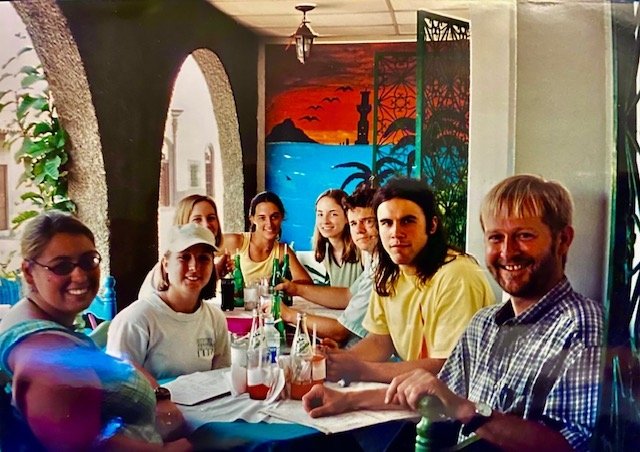
Axtell’s words have provided solace at memorial services, and encouragement at myriad college events, including campus vigils during times of national or global crisis, and a dozen baccalaureate addresses. But it’s his work uniting members of the Centre Community in marriage that stands out, with more than 100 names on the roll.
But most of those are much more than names with a centre.edu email address. They are students, colleagues and friends. Those Axtell has mentored and traveled with... laughed with and cried with… comforted and celebrated.
His services match that profound connection as he weaves details from the story of their lives into the service.
“I’m putting a lot of myself into it,” he said. “I like that. I value the relational bond and the process itself, and these are people I cherish as friends for life.”
Axtell also pours himself into the task when asked to perform memorial services, a somber task he has taken on more than a dozen times during his 30 years. It’s another form of serving and helping the community — not only offering words of comfort, but actually providing help in what is one of life’s hardest moments.
“That is a pivotal juncture where you can be present when someone needs presence. Or you can be the person they need to organize things when everything for them is chaos and life has fallen apart,” he said. “It means a lot to be able to be in those moments with them.”
Those moments of service — those markers that stand out in the timeline that is our lives — that’s where you will find Rick Axtell. From helping students learn who they are and who they will become, to uniting coworkers and loved ones.
“I always say the primary root of empathy is when you are in touch with your own emotions — your own thoughts, your own fears, your own pain,” he said. “You realize these are among the things that are common to all of us because you know them in yourself.”
—————————
Milestone Man
By John Kinkade
Professor of English
Reader, he married us.
I mean specifically that Rick Axtell officiated my wedding to Niki, in June of 2007, in the backyard of our house in Danville. But the “us” in the first sentence is a big us. The Centre College us.
To have Rick officiate your wedding is a bit like joining a subfamily in the Centre mafia, a community within a community. And what number of Centre alumni, faculty and staff have been present for these weddings?
It’s fitting that Rick has been there to make so many unions official: He understands the power of connection, of community, of union, and one of his great spiritual gifts is his ability to bring others into the shared spaces that bind us. Who has done more work to make Centre a real community than Rick Axtell?
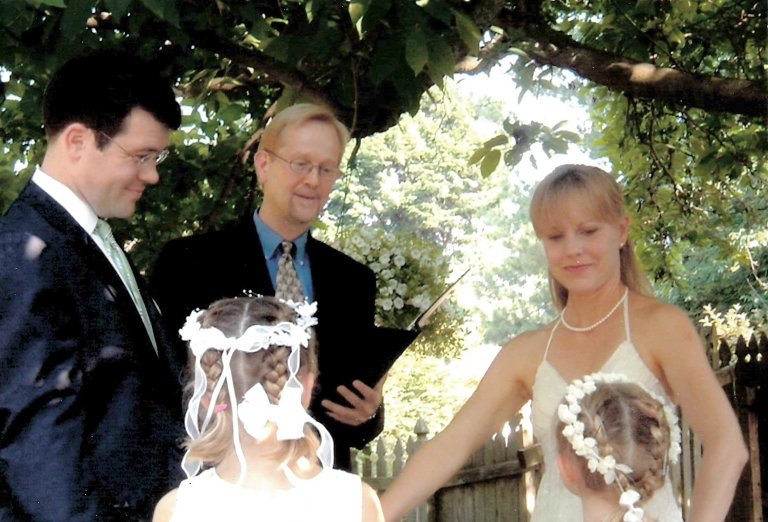
If your memory of Victorian novels is shaky, my first line adapts Charlotte Bronte’s “Jane Eyre,” where she announces her marriage at the beginning of the last chapter. Weddings are endpoints in novels, but in life they are better understood as beginnings.
I can’t count how many students have sat in my office and talked about what a magical and transformative teacher Rick Axtell has been for them. Niki and I, and all of those for whom Rick has officiated, have been transformed by him. He has set us on a path as surely as he has set his students on a path, shepherding us into a new life.
One of the things that great novels do is remind us of the power of language: it’s magical. It makes things happen. When you say “I do,” you change your existence in the world. So in that sense, my wife Niki and I got to be part of the language-as-magic process. But the real magician at our wedding was Rick Axtell.
No one I know speaks more magical words than Rick Axtell. When I locked Rick in as the officiant for my wedding in 2007 (the going rate at the time: a hundred bucks and a bottle of dark rum), I knew how magical a speaker he could be. Or thought I knew. When he’s there in front of you, sending you off on the biggest journey of your life, you’re not really prepared for the spell that Rick can weave.
Of course, I must confess this: I only remember some of what he talked about because on your wedding day you’re also thinking about whether there’s enough food, whether it will rain, if everyone’s comfortable.
I know our ceremony was built around “The Odyssey” because I had asked Rick to make that the reigning conceit. “The Odyssey” was the first book a generation of Centre students read upon arriving in Danville, and though my wife is not a Centre grad (and at first, a little concerned about how into being Centre grads we all are), when Rick developed a ceremony out of the idea, it made sense of our lives, and our love, in ways that start to defy my own language.
It's a poem of homecoming, of course, but also a story of enduring love, of a couple, and of children and parents. (That last part is especially important for us: we were a family of four from the day we got married.)
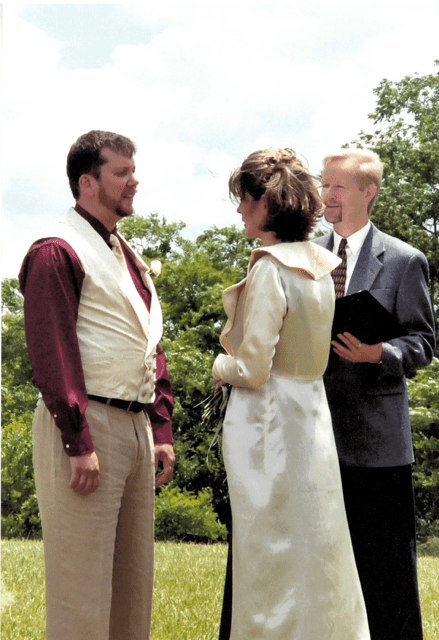
I’ve known officiants who are all business — get the legalities taken care of and be done. The moment will matter no matter what: Rick has the power to make it matter more, to open up the emotional resonance fully.
I’ve been at Centre long enough that I’ve been to several funerals where Rick officiated, and you may wonder: have I had the thought that though I have no interest in dying, it would at least be some consolation to have Rick deliver my eulogy?
Reader, I have.
In the fall of 2007, Tom McKune’s funeral took place in Weisiger Theater, and the stage had already been set up for the student production; it was too late to take it down, the service had to take place among the doors that had been set up for the actors’ entrances and exits. Rick walked onto stage and, unscripted, opened all the doors, a metaphor for what Tom had done in life. I didn’t know Tom well, but when I was a student, he was director of international programs, and he had opened that door for me, one of the most profound changes in my life.
Wedding, funeral, baccalaureate sermon just before commencement: Rick Axtell has helped us make sense of the biggest moments in our lives; he has shepherded us into new understandings of who we have been, and are, and can become.

